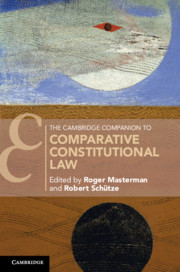Book contents
- Reviews
- The Cambridge Companion to Comparative Constitutional Law
- Cambridge Companions to Law
- The Cambridge Companion toComparative Constitutional Law
- Copyright page
- Contents
- Notes on Contributors
- Acknowledgements
- Table of Cases (Selection)
- Abbreviations
- Introduction
- Part I Theoretical Foundations
- Part II Historical Experiences
- 3 The United Kingdom Constitution
- 4 French Constitutional Law
- 5 US Constitutional Law and History
- 6 The Constitution of the Republic of India
- 7 The Constitution of China
- Part III Constitutional Principles
- Part IV State Institutions
- Part V Transnational Constitutionalism
- Index
- References
7 - The Constitution of China
from Part II - Historical Experiences
Published online by Cambridge University Press: 30 September 2019
- Reviews
- The Cambridge Companion to Comparative Constitutional Law
- Cambridge Companions to Law
- The Cambridge Companion toComparative Constitutional Law
- Copyright page
- Contents
- Notes on Contributors
- Acknowledgements
- Table of Cases (Selection)
- Abbreviations
- Introduction
- Part I Theoretical Foundations
- Part II Historical Experiences
- 3 The United Kingdom Constitution
- 4 French Constitutional Law
- 5 US Constitutional Law and History
- 6 The Constitution of the Republic of India
- 7 The Constitution of China
- Part III Constitutional Principles
- Part IV State Institutions
- Part V Transnational Constitutionalism
- Index
- References
Summary
Does China have a constitution? That depends on the way in which the word ‘constitution’ is understood. It is commonly thought that China did not have a written constitution until 1908, when the last dynasty enacted the Outline of Imperial Constitution (qinding xianfa dagang), but this does not mean that traditional China was not governed by basic rules and norms. As I argued previously, the Confucian cultural tradition that dominated China for over 2,000 years was centred on the fundamental moral precepts of humanity (ren) and righteousness (yi), around which an elaborate body of rules on rites, ceremonies, etiquette, and other aspects of human behaviour was developed.1 Taken together, they formed a vast normative system of ‘propriety’ (li, sometimes translated as ‘rites’),2 which stood for a set of customs, conventions and procedures to be practiced in daily life for the purposes of cultivating moral virtue, directing and containing human passions, and preserving a well-ordered society. Indeed, these rules were collected in a dense Book of Rites (Li Ji) and enforced by generations of the Confucian gentry, to various degrees of efficacy. To that extent, the traditional China did have a constitution – even a written constitution, if ‘constitution’ is meant to be a set of fundamental rules that govern society.
- Type
- Chapter
- Information
- Publisher: Cambridge University PressPrint publication year: 2019

